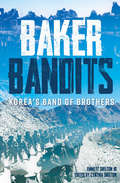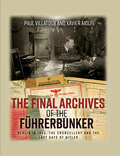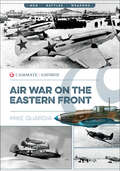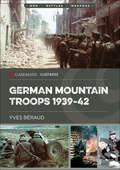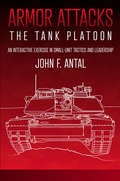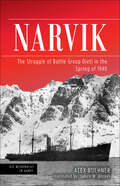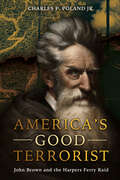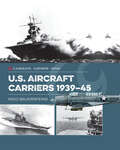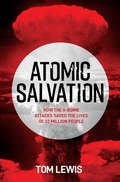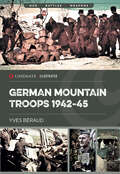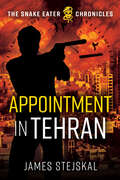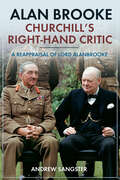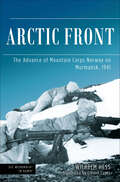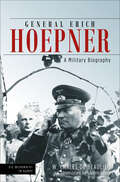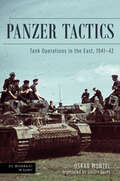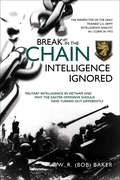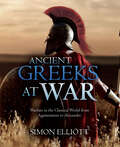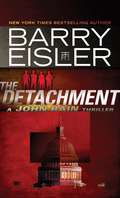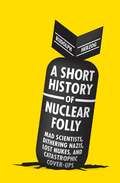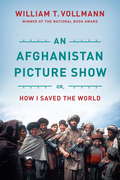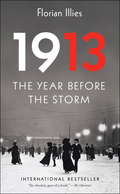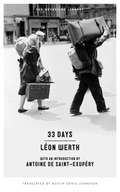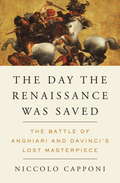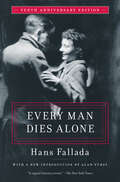- Table View
- List View
Baker Bandits: Korea's Band of Brothers
by Emmett Shelton Jr.An anthology of first-hand accounts of the Baker Bandits, U.S. Marines on the front line of battle during the Korean War.B-1-5 was a unique company in the Korean War. The Baker Bandits fought at Inchon, Naktong, Chosin Reservoir, Guerrilla Hunts and the many numbered hills. They inspired one B Company Commander, Gen. Charlie Cooper, to the extent that when he became Commanding General of the Marines First Division in 1977, his time with B-1-5 inspired his “Band Of Brothers Leadership Principles” used widely in the Corps for many years.Emmett Shelton was a nineteen-year-old Marine Reservist in 1950. He was called to duty after graduating Austin High School and, within six months, he was a rifleman in Korea. The Korean winter of 1950 was brutal, and Emmett was evacuated shortly after Chosin due to frostbite. After the war, Emmett got on with life, then in the 1980s he attended a Chosin Few Reunion. He was overwhelmed by a need to reconnect with his old Company, his Baker Bandits.Emmett tracked down B Company members one-by-one and started a newsletter, The Guidon, to share stories and reconnect. For twenty years Emmett published The Guidon, monthly. The contributing readership grew to a high of 300, including a number of young B Company Marines fighting in Afghanistan. The Baker Bandits brings together firsthand accounts from The Guidon, written by the men of B-1-5 about their time in Korea: their battles, their fallen commanders, death in the foxhole, lost platoons, injuries, and what happened to them after the war.Praise for Baker Bandits“The accounts include writings by officers, non-commissioned officers, and enlisted men, all of whom shared the terrible experiences of the Korean War together. This method of organizing the book is unusual, but it works well here, with a natural flow to the narrative due to careful editing and ordering. The veterans of the Korean War are almost all gone now. While their war was smaller in scope, their actions and service deserve to be remembered.” —Military Heritage Magazine“The accounts give an intensely personal look at [the marines’] experiences in the war, interspersed with historical narrative and sobering lists of casualties.” —Seapower
The Final Archives of the Führerbunker: Berlin in 1945, the Chancellery and the Last Days of Hitler
by Paul Villatoux Xavier AiolfiCollected documents offering a look into the minds of the Third Reich’s leaders in their final days, and at Berlin following the end of World War II.In November 1945, two French officers secretly entered the Führerbunker, the air raid shelter near the Chancellery in Berlin. The bunker was the last home of Adolf Hitler; the background of the last months of his life and the war; where he married Eva Braun on April 29, 1945; and where he killed himself less than two days later.In the middle of a heap of furniture and broken objects, the two officers found hundreds of documents littering the ground. Among the documents that they retrieved were a dozen telegrams of historic importance that allow us to understand the spirit of the last leaders of the Third Reich as well as the events that took place between April 23 and 26, 1945. These and other documents are presented for the first time in this book, shown in their proper context with an expert commentary.“But although the building may have gone, troves of historic documents survived. Now, many have been published for the first time in this new visual history, an excellent guide to the horrendous final days, hours, and minutes of the Third Reich.” —Military History Matters
Air War on the Eastern Front (Casemate Illustrated #Cis0019)
by Mike GuardiaA pictorial history of Nazi Germany’s entire air campaign against the Soviet Union on the Eastern Front in World War II.The Red Air Force versus the Luftwaffe in the skies over Eastern Europe. June 1941: Having conquered most of Western Europe, Adolf Hitler turned his attention to the vast Soviet Union. Disregarding his Non-Aggression Pact with Joseph Stalin, Hitler launched Operation Barbarossa, a full-scale invasion of the Soviet homeland . . . aimed squarely at Moscow.In the skies over Russia, the battle-hardened airmen of the Luftwaffe made short work of the Red Air Force during opening days of Barbarossa. To make matters worse, Stalin had executed many of his best pilots during the perennial “purges” of the 1930s. Thus, much of the Red Air Force was destroyed on the ground before meeting the Luftwaffe in the skies. By 1944, however, the Soviet airmen had regained the initiative and fervently wrested air superiority from the now-ailing Axis Powers.“Will be of great interest to both modelers and aircraft historians alike.” —AMPS Indianapolis“This slim survey provides a quick, convenient intro to the deadly totalitarian duel. Make it a launchpad to further study of Eastern Front air combat in WWII.” —Cybermodeler“The prose is smooth and provides a top-level look at WWII German and Soviet air warfare.” —Historical Miniatures Gaming Society
German Mountain Troops, 1939–42 (Casemate Illustrated #20)
by Yves BéraudA pictorial history of the Nazi military’s elite Gebirgstruppen during World War II.Fifteen elite mountain divisions and a multitude of small units fought for the Wehrmacht during World War II. They fought on all fronts, operating in hostile environments ranging from the far north to Libya, the Atlantic to the Caucasus—serving in all the “hot spots.” This book, the culmination of some four decades of research and the support of many veterans and collectors, describes the life, operations and equipment of these specialist units.“A very illuminating study on some of WWII Germany’s finest combat troops in their most successful actions of the early war period.” —AMPS“Supported by a great collection of colour and monochrome photographs - one with the men wearing patterned tablecloths to stave off the cold in Norway is my favourite. . . . It will appeal to readers interested in the German army in the early phases of World War II.” —Wargames Illustrated
Armor Attacks: An Interactive Exercise in Small-unit Tactics and Leadership
by John F. Antal“Extremely clever . . . part tactical decision game (TDG), part combat adventure page turner, and part The Defense of Duffer’s Drift.” —Capt. Randall P. Newman, USMCIn this unique, interactive story, you are the leader of a U.S. Army M1 Abrams tank platoon. Throughout the text, you’ll have an opportunity to make life-or-death decisions, and the events that unfold will be dictated by the choices you make. As you progress through the book, you’ll learn important tactical and operational lessons. Whether or not you are—or want to be—a tank platoon leader, you’ll find this book both highly entertaining and instructive.There are two operations to survive—an assault and a counter-reconnaissance mission. In each you must bring your knowledge and judgment to bear on the scenario in order to achieve the objective. If you choose wrong, defeat and even death may be your fate. If you succeed, you can savor the taste of victory and live to fight another day. The scenarios are highly realistic, and there are maps and appendices with detailed specifications of the hardware involved to help you make informed decisions.Written before Operation Desert Storm and published in 1991, Armor Attacks may feature military technology that’s dated by today’s standards—but the need for human leadership and effective, rapid decision-making has not changed. Armor Attacks was recognized as an invaluable teaching tool by United States Military Academy, West Point and was used to teach cadets the essential skills of leadership, decision-making, and tactics—a decade of USMA leaders trained with this book. To supplement the original text, this new edition includes the West Point instructor reference guide, which explains and amplifies the teaching points of each scenario encountered.
Narvik: The Struggle of Battle Group Dietl in the Spring of 1940 (Die Wehrmacht im Kampf)
by Alex Buchner“An intensely detailed historical account and counterfactual analysis of the strategic dilemmas faced by German and Allied forces at Narvik.” —Naval Historical FoundationPublished for the first time in English, this is a German account of the German invasion of Norway in the spring of 1940. It focuses on the efforts of Group “1” led by Eduard Dietl. This group of Gebirgstruppen—mountain troops—was landed at Narvik in early April by ten destroyers. These ships were then all sunk by the Allies. Dietl’s troops were outnumbered by Allied troops but his defense utilized ammunition, food and sailors from the sunken ships and his men retook Narvik once the Allies abandoned their efforts to push the Germans out of Norway.“The book does provide detailed accounts of the numerous battles and skirmishes around Narvik in the spring of 1940. The maps are useful to help understand the terrain and geography. The focus of the text is at the tactical level, and any historian interested in the tactics of the Norwegian campaign or of German mountain troops at this time would find this especially useful.” —Journal of Military History“The story of Dietl’s improvisation in the face of such inadequacies is quite impressive . . . the best account in English of the German side of Narvik.” —Stone & Stone Second World War Books“A fascinating look at the battle from the German side. While the book does reflect the attitudes of the time it was written, it also reveals what the German troops faced and provides a good account of the various engagements in and around Narvik.” —WWII History Magazine
America's Good Terrorist: John Brown and the Harpers Ferry Raid
by Charles P. Poland Jr.<p>A biography of John Brown, examining his failed raid on Harpers Ferry, and the part his actions played in causing the Civil War.<p> <p>John Brown’s failed efforts at Harpers Ferry have left an imprint upon our history, and his story still swirls in controversy. Was he a madman who felt his violent solution to slavery was ordained by Providence or a heroic freedom fighter who tried to liberate the downtrodden slave? These polar opposite characterizations of the violent abolitionist have captivated Americans. The prevailing view from the time of the raid to well into the twentieth century—that his actions were the product of an unbalanced mind—has shifted to the idea that he committed courageous acts to undo a terrible injustice.<p> <p>Despite the differences between modern terrorist acts and Brown’s own violent acts, when Brown’s characteristics are compared to the definition of terrorism as set forth by scholars of terrorism, he fits the profile. Nevertheless, today Brown is a martyred hero who gave his life attempting to terminate the evil institution of human bondage. The modern view of Brown has unintentionally made him a “good terrorist,” despite the repugnance of terrorism that makes the thought of a benevolent or good terrorist an oxymoron.<p> <p>This biography covers Brown’s background and the context to his decision to carry out the raid, a detailed narrative of the raid and its consequences for both those involved and America; and an exploration of the changing characterization of Brown since his death.<p>
U.S. Aircraft Carriers 1939–45 (Casemate Illustrated Special)
by Ingo BauernfeindA detailed and fully illustrated account of the development of American aircraft carriers up to and during World War II. This extensively illustrated volume tells the dramatic yet successful story of U.S. aircraft carriers in World War II by class, ranging from early pre-war designs to escort carriers built from destroyer hulls, to the gigantic fleet carriers serving as the predecessors of modern-day super carriers. Besides covering the famous great carrier battles in the Pacific, this book also tells of the equally important actions of U.S. flat tops hunting and destroying German U-boats in the Atlantic, making an enormous contribution to the elimination of the U-boat dangers and the safe arrival of transatlantic supplies, so desperately needed for the launch of D-Day. Including profiles and explanatory text boxes, the concise text gives a clear overview of each ship&’s career, its fate and its significance in American naval history. Moreover, the reader learns about the technical evolution of U.S. carriers throughout the war, and the various aircraft launched from these magnificent vessels to engage their Japanese or German foes. This volume provides an overview of preserved World War II flat tops serving as floating museums for future generations as well as a dive to the sunken U.S.S. Saratoga at Bikini Atoll.Praise for U.S. Aircraft Carriers 1939–45 &“Bauernfeind brings to the reader a fitting conclusion to a superb historical portrait of these capital warships that carried naval aviation to victory in World War II. This is an exemplary work and is recommended as an introductory reference for readers not already steeped in World War II ship history.&” —Air Power History &“The coverage of the CVEs and CVLs, coupled with the book&’s first-rate graphics, profuse and precisely captioned photographs, well-written text, and reasonable price make it a very good choice for readers looking for an overview of U.S. carriers in World War II.&” —Naval Historical Foundation
Atomic Salvation: How the A-Bomb Saved the Lives of 32 Million People
by Tom LewisA thought-provoking analysis of the bombing of Hiroshima and Nagasaki—and what might have happened if conventional weapons were used instead.It has always been a difficult concept to stomach—that the atomic bombs dropped on Hiroshima and Nagasaki in 1945, causing such horrific suffering and destruction, also brought about peace. Attitudes toward the event have changed through the years, from grateful relief that World War II was ended to widespread condemnation of the United States.Atomic Salvation investigates the full situation—examining documents from both Japanese and Allied sources, but also using in-depth analysis to extend beyond the mere recounting of statistics. It charts the full extent of the possible casualties on both sides had a conventional assault akin to D-Day gone ahead against Japan. The work is not concerned solely with the military necessity to use the bombs; it also investigates why that necessity has been increasingly challenged over the successive decades.Controversially, the book demonstrates that Japan would have suffered far greater casualties—likely around 28 million—if the nation had been attacked in the manner by which Germany was defeated: by amphibious assault, artillery and air attacks preceding infantry insertion, and finally by subduing the last of the defenders of the enemy capital. It also investigates the enormous political pressure placed on America as a result of their military situation. The Truman administration had little choice but to use the new weapon given the more than a million deaths that Allied forces would undoubtedly have suffered through conventional assault.By chartingreaction to the bombings over time, Atomic Salvation shows that there has been relentless pressure on the world to condemn what at the time was seen as the best, and only, military solution to end the conflict. Never has such an exhaustive analysis been made of the necessity behind bringing World War II to a halt.
German Mountain Troops 1942–45 (Casemate Illustrated)
by Yves Béraud"The author does a terrific job of outlining the many campaigns and areas where the German Mountain troops fought throughout the war, and the unique challenges that some of these areas brought." — AMPSWhen World War II began, the Wehrmacht had fifteen mountain divisions and a multitude of small units, including some Austrian units that had been incorporated into the German army after the Anschluss. These mountain units would operate in hostile environments on all fronts during World War II. Due to their training, equipment and adaptability, the Gebirgstruppen would be deployed to fight in almost every theater. In the last years of the war they would see action in North Africa, Italy, the Balkans, Norway and Finland, and in the West as the Allies pushed German forces back toward Berlin. This book, the culmination of four decades of research and the support of many veterans and collectors, describes the uniform, equipment, and operations of these specialist units during the later years of World War II. The text is complemented by period photographs taken at the front, including many color photographs, and modern photographs of uniform details.
Appointment in Tehran: A Cold War Spy Thriller (The Snake Eater Chronicles Series #2)
by James StejskalWhen radical Iranian students seize the U.S. Embassy compound in Tehran and take over fifty diplomats hostage the U.S. President has to negotiate with a government that wants only to humiliate the United States. When talks fail, the President must turn to the military to bring the Americans home by force. As preparations are made for an audacious rescue, an American intelligence officer hides alone in a Tehran safehouse with a secret. He is protecting a powerful weapon known as the Perses Device, which is now at risk of being captured and employed against the United States. The Agency Director orders that it must be brought out at all costs. But as a small American team clandestinely enters Tehran to lead the way for the rescue force, a traitor spills the secret and KGB Spetsnaz operatives begin their own search for the weapon. At the last minute, one more American is added to the advance team—his sole mission is to get the Agency officer and the Perses device to safety. When the rescue mission fails, only two Americans are left to run the gauntlet of enemy agents and get the weapon out. Getting in was easy…
Alan Brooke—Churchill's Right-Hand Critic: A Reappraisal of Lord Alanbrooke
by Andrew SangsterThis new biography of Churchill&’s top WWII advisor is &“an excellent book for anyone interested in military leadership&” (The NYMAS Review). Voted the greatest Briton of the twentieth century, Winston Churchill has long been credited with almost single-handedly leading his country to victory in World War II. But without Alan Brooke, a skilled tactician, at his side the outcome might well have been disastrous. Brooke, Chief of the Imperial General Staff, more often than not served as a brake on some of Churchill&’s more impetuous ideas. However, while Brooke&’s diaries reveal his fury with some of Churchill&’s decisions, they also reveal his respect and admiration for the wartime prime minister. In return Churchill must surely have considered Brooke one of his most difficult subordinates—but later wrote that he was &“fearless, formidable, articulate, and in the end convincing.&” As CIGS, Brooke was integral to coordination between the Allied forces, and so had to wrestle with the cultural strategy clash between the British and Americans. Comments in his diaries offer up his opinions of both his British and American military colleagues—his negative assessments of Mountbatten&’s ability, and acerbic comments on the difficult character of de Gaulle and the weaknesses of Eisenhower. Conversely, he was clearly overindulgent in the face of Montgomery&’s foibles. Brooke was often seen as a stern and humorless figure, but a study of his private life reveals a little-seen lighter side, a lifelong passion for birdwatching, and abiding love for his family. The two tragedies that befell his immediate family were a critical influence on his life. Andrew Sangster completes this new biography with a survey of the way various historians have assessed Brooke, explaining how he has lapsed into seeming obscurity in the years since his crucial part in the Allied victory in World War II.
Arctic Front: The Advance of Mountain Corps Norway on Murmansk, 1941 (Die Wehrmacht im Kampf)
by Wilhelm Hess“A very thorough analysis as to why and how the combined German-Finnish army . . . ultimately failed in their quest to seize Murmansk during Barbarossa.” —Globe at WarIn 1941, military operations were conducted by large formations along the northern coast of Scandinavia—for the first time in the history of warfare. The Arctic Front was the northernmost theater in the war waged by Germany against Russia. For a period of four years, German troops from all branches of the Wehrmacht fought side by side with Finnish border guard units.The high point of the war on the Arctic Front was the assembly and advance of Germany’s Mountain Corps Norway in the summer and autumn of 1941. Commanded by general of the mountain troops, Eduard Dietl, and composed of the 2nd and 3rd Mountain Divisions, the Mountain Corps advanced out of occupied North Norway, assembled in the Petsamo Corridor in North Finland, and struck into Russian territory in an attempt to seize Murmansk. It did not reach its objective. This account of the operation was written by Wilhelm Hess, quartermaster of the Mountain Corps Norway. He draws upon his personal experience of the conditions and actions on the Arctic Front in order to describe and analyze the environment, the sequence of events, and the reasons behind certain decisions. In addition to describing how operations conducted by the Mountain Corps unfolded, Hess provides insight as to how the terrain, the flow of supplies, and the war at sea impacted those operations.“A serious, thoughtful book about war . . . in conditions hardly conducive to survival, let alone combat.” —Stone & Stone
General Erich Hoepner: A Military Biography (Die Wehrmacht im Kampf)
by Chales de BeaulieuWritten by Hoepner's chief of staff on the Eastern Front, this military biography of the German WWII general is available in English for the first time.This biography of Erich Hoepner was written by Walter Chales de Beaulieu, a general staff officer who fought alongside him. It examines his leadership of panzer formations in Poland in 1939, France in 1940, and Russia in 1941. Hoepner was one of the most competent tank commanders of World War II, playing a significant role in Germany’s early successes. As the commander of the XVI Panzer Corps in 1939, Hoepner carried out the main thrust towards Warsaw, reaching the outskirts of the city in only eight days. With the same formation, he fought the French Cavalry Corps in Belgium, partook in the encirclement of Allied forces near Dunkirk, and advanced southwards over the Weygand Line deep into French territory. In 1941, Hoepner became the commander of Panzer Group 4, the main attack formation for the advance on Leningrad. In this book, Walter Chales de Beaulieu provides insight into Erich Hoepner’s ability as a panzer commander, painting a picture of a man who was committed to the military profession.
Panzer Tactics: Tank Operations in the East, 1941–42 (Die Wehrmacht im Kampf)
by Oskar MunzelA detailed analysis of raids and advances taken by panzer units on the Eastern Front in 1941–42. This book discusses a number of operations undertaken by the XXXXVIII Panzer Corps in the direction of the Black Sea in 1941 and 42. It explores the tactics used and why they were successful, based upon the detailed combat reports prepared by the corps staff immediately after each battle. Die Wehrmacht im Kampf is a series published in Germany in the 1950s and 1960s. Written by ex-members of the German army in WWII, it provides important information not available elsewhere on the German army’s perspective of many crucial campaigns and battles. None of the volumes have previously been available in English. Each volume has a modern introduction by Professor Matthias Strohn, expert on the German army.
Break in the Chain—Intelligence Ignored: Military Intelligence in Vietnam and Why the Easter Offensive Should Have Turned out Differently
by W. R. BakerA riveting combination of war memoir and unique examination of the role of intelligence during the Easter Offensive 1972 written by an intelligence analyst who was there in 1972. For the first two weeks of the Easter Offensive of 1972, the 571st Military Intelligence Detachment provided the only pertinent collateral intelligence available to American forces. Twice daily, the Detachment provided intelligence to the USS Buchanan (DDG-14), US Navy SEALS, and Special Forces units including tactical and strategic forecasts of enemy movements, information that was otherwise unavailable to U.S. units and advisors in-country. In the weeks before the offensive, vital agent reports and verbal warnings by the 571st MI Detachment had been ignored by all the major commands; they were only heeded, and then only very reluctantly, once the Offensive began. This refusal to listen to the intelligence explains why no Army or USMC organizations were on-call to recover prisoners discovered or U.S. personnel downed behind enemy lines, as in the BAT-21 incident, as the last two Combat Recon Platoons in Vietnam had been disbanded six weeks before the offensive began. The lessons and experiences of Operation Lam Son 719 in the previous year were ignored, especially with regard to the NVA’s tactical use of tanks and artillery. In his memoir, Bob Baker, the only trained military intelligence analyst with the 571st MI Detachment in 1972, reveals these and other heroics and blunders during a key moment in the Vietnam War.
Ancient Greeks at War: Warfare in the Classical World from Agamemnon to Alexander
by Simon Elliott&“A detailed, insightful survey of Greek warfare&” with illustrations and &“many well-informed and highly perceptive observations&” (Choice). In this book, historian and archaeologist Simon Elliott considers the different fighting styles of Greek armies and discusses how Greek battles unfolded. Covering every aspect of warfare in the Ancient Greek world from the beginnings of Greek civilization to its assimilation into the ever-expanding world of Rome, it begins with the onset of Minoan culture on Crete around 2000 BC, then covers the arrival of the Mycenaean civilization and the ensuing Late Bronze Age Collapse before moving on to Dark Age and Archaic Greece. This sets the scene for the flowering of Classical Greek civilization, as told through detailed narratives of the Greek and Persian Wars, the Peloponnesian Wars, and the rise of Thebes as a major power. The book then moves on to Macedonian domination under Philip II, before focusing on the exploits of his son Alexander the Great, the all-conquering hero of the ancient world. His legacy was the Hellenistic world with its multiple, never-ending series of conflicts that took place over a huge territory, ranging from Italy in the west all the way to India in the east. Topics covered include the various Wars of the Successors, the rise of the Bactrian-Greek and Indo-Greek kingdoms, the wars between the Antigonid Macedonian, Seleucid, and Ptolemaic kingdoms, and later the clash of cultures between the rising power of Rome in the west and the Hellenistic kingdoms. In the long run the latter proved unable to match Rome&’s insatiable desire for conquest in the eastern Mediterranean, and this together with the rise of Parthia in the east ensured that one by one the Hellenistic kingdoms and states fell. The book ends with the destruction of Corinth in 146 BC after the defeat by Rome of the Achaean League—and concludes by considering the legacy of the Ancient Greeks in the Roman world, and subsequently. &“A comprehensive survey, smoothly written by an expert popularizer of ancient history. A tour de force.&” —NYMAS Review
The Detachment (John Rain Thriller #7)
by Barry EislerWhen legendary black ops veteran Colonel Scott "Hort" Horton tracks Rain down in Tokyo, Rain can't resist the offer: a multi-million dollar payday for the "natural causes" demise of three ultra-high-profile targets who are dangerously close to launching a coup in America. But the opposition on this job is going to be too much for even Rain to pull it off alone. He'll need a detachment of other deniable irregulars: his partner, the former Marine sniper, Dox. Ben Treven, a covert operator with ambivalent motives and conflicted loyalties. And Larison, a man with a hair trigger and a secret he'll kill to protect. From the shadowy backstreets of Tokyo and Vienna, to the deceptive glitz and glamour of Los Angeles and Las Vegas, and finally to a Washington, D. C. in a permanent state of war, these four lone wolf killers will have to survive presidential hit teams, secret CIA prisons, and a national security state as obsessed with guarding its own secrets as it is with invading the privacy of the populace. But first, they'll have to survive each other. The Detachment is what fans of Eisler, "one of the most talented and literary writers in the thriller genre" (Chicago Sun-Times), have been waiting for: the worlds of the award-winning Rain series, and of the bestselling Fault Line and Inside Out, colliding in one explosive thriller as real as today's headlines and as frightening as tomorrow's.
A Short History of Nuclear Folly: Mad Scientists, Dithering Nazis, Lost Nukes, and Catastrophic Cover-ups
by Jefferson Chase Rudolph HerzogIn the spirit of Dr. Strangelove and The Atomic Café, a blackly sardonic people's history of atomic blunders and near-misses revealing the hushed-up and forgotten episodes in which the great powers gambled with catastrophe. Rudolph Herzog, the acclaimed author of Dead Funny, presents a devastating account of history's most irresponsible uses of nuclear technology. From the rarely discussed nightmare of "Broken Arrows" (40 nuclear weapons lost during the Cold War) to "Operation Plowshare" (a proposal to use nuclear bombs for large engineering projects, such as a the construction of a second Panama Canal using 300 H-Bombs) . . . Herzog focuses in on long-forgotten nuclear projects that nearly led to disaster.Digging deep into archives, interviewing censored scientists, and including dozens of photos, Herzog also explores the "accidental" drop of a Nagasaki-type bomb on a train conductor's home, the implanting of plutonium into patients' hearts, and the invention of wild tactical nukes, including weapons designed to kill enemy astronauts.Told in a riveting narrative voice, Herzog--the son of filmmaker Werner Herzog--also draws on childhood memories of the final period of the Cold War in Germany, the country once seen as the nuclear battleground for NATO and the Warsaw Pact, and discusses evidence that Nazi scientists knew how to make atomic weaponry ... and chose not to. An unprecedented people's history.
An Afghanistan Picture Show
by William T. VollmannNever before available in paperback and all but invisible for twenty years, a personal account of the origins of America's longest war.In 1982, the young William Vollmann worked odd jobs, including as a secretary at an insurance company, until he'd saved up enough money to go to Afghanistan, where he wanted to join the mujahedeen to fight the Soviets. The resulting book wasn't published until 1992, and Library Journal wrote: "The wrong book written at the wrong time. . . . With the situation in Afghanistan rapidly heading toward resolution . . . libraries may safely skip this."Thirty years later--and with the United States still mired in the longest war of its history--it's time for a reassessment of Vollmann's heartfelt tale of idealism and its terrifying betrayals.An alloy of documentary and autobiographical elements characteristic of Vollmann's later nonfiction, An Afghanistan Picture Show is not a work of conventional reportage; instead, it's an account of a subtle and stubborn consciousness grappling with the limits of will and idealism imposed by violence and chaos.
1913
by Shaun Whiteside Florian Illies Jamie Lee SearleJust before one of its darkest moments came the twentieth century's most exciting year . . .It was the year Henry Ford first put a conveyer belt in his car factory, and the year Louis Armstrong first picked up a trumpet. It was the year Charlie Chaplin signed his first movie contract, and Coco Chanel and Prada opened their first dress shops. It was the year Proust began his opus, Stravinsky wrote The Rite of Spring, and the first Armory Show in New York introduced the world to Picasso and the world of abstract art. It was the year the recreational drug now known as ecstasy was invented.It was 1913, the year before the world plunged into the catastrophic darkness of World War I.In a witty yet moving narrative that progresses month by month through the year, and is interspersed with numerous photos and documentary artifacts (such as Kafka's love letters), Florian Illies ignores the conventions of the stodgy tome so common in "one year" histories. Forefronting cultural matters as much as politics, he delivers a charming and riveting tale of a world full of hope and unlimited possibility, peopled with amazing characters and radical politics, bristling with new art and new technology . . . even as ominous storm clouds began to gather.From the Hardcover edition.
33 Days
by Austin D. Johnston Leon WerthA rare eyewitness account by an important author of fleeing the Nazis' march on Paris in 1940, featuring a never-before-published introduction by Antoine de Saint-Exupéry. In June of 1940, Leon Werth and his wife fled Paris before the advancing Nazis Army. 33 Days is his eyewitness account of that experience, one of the largest civilian dispacements in history. Encouraged to write 33 Days by his dear friend, Antoine de Saint-Exupéry, author of The Little Prince, Werth finished the manuscript while in hiding in the Jura mountains. Saint-Exupéry smuggled the manuscript out of Nazi-occupied France, wrote an introduction to the work and arranged for its publication in the United States by Brentanos. But the publication never came to pass, and Werth's manuscript would disappear for more than fifty years until the first French edition, in 1992. It has since become required reading in French schools. This, the first-ever English language translation of 33 Days, includes Saint-Exupéry's original introduction for the book, long thought to be lost. It is presented it here for the first time in any language. After more than seventy years, 33 Days appears--complete and as it was fully intended.From the Trade Paperback edition.
The Day the Renaissance Was Saved
by Niccolo Capponi Andre Naffis-SahelyIn the tradition of big-picture histories like The Swerve, a riveting account of a battle that changed the course of history--and a lost masterpiece by Leonardo da Vinci When the armies of Florence, Venice, and the Papal States clashed with the forces of the Republic of Milan on June 29, 1440, the outcome would bring the Medicis to power and lead to the Renaissance. Into this deeply researched and ground-breaking book on the little-known battle of Anghiari, Capponi weaves the story of a lost fresco that Leonardo da Vinci was commissioned to paint to commemorate the battle on the wall of the Palazzo Vecchio--directly across from his rival, Michelangelo. Da Vinci abandoned the work and it was soon painted over. Now, hundreds of years later, the Italian researcher Maurizio Seracini has proved that da Vinci's original art is still there, and he's working to uncover it. Niccolo Capponi's The Day the Renaissance Was Saved combines a thrilling narrative of battle with the mystery of a famous painting gone missing, rolling military history, art history, and political history all into one, with a heavy does of the ever-fascinating Medicis--who schemed, plotted, and funded the creation of masterpieces right alongside the author's family.From the Hardcover edition.
Every Man Dies Alone: Special 10th Anniversary Edition
by Hans FalladaThis never-before-translated masterpiece—by a heroic best-selling writer who saw his life crumble when he wouldn’t join the Nazi Party—is based on a true story.It presents a richly detailed portrait of life in Berlin under the Nazis and tells the sweeping saga of one working-class couple who decides to take a stand when their only son is killed at the front. With nothing but their grief and each other against the awesome power of the Reich, they launch a simple, clandestine resistance campaign that soon has an enraged Gestapo on their trail, and a world of terrified neighbors and cynical snitches ready to turn them in.In the end, it’s more than an edge-of-your-seat thriller, more than a moving romance, even more than literature of the highest order—it’s a deeply stirring story of two people standing up for what’s right, and for each other.
City of Sparrows
by Eva NourBased on a true story — the thoughtful, raw, and ultimately heartening tale of a young man fighting for survival in a city under siegeGrowing up in Syria in the 1990s, Sami&’s childhood was unremarkable. His day-to-day life largely sheltered him from the horrors of the authoritarian government, until he founded a successful internet company—which landed him on the regime&’s radar. Suddenly Sami finds himself in jail, then forcibly enlisted into the Syrian army during the early days of a fast-growing civil uprising. Assigned to the mapmaking division, Sami yearns to simply serve his time and go home, even as he finds himself literally charting the course of the army&’s response to the growing revolt. The situation that hits him full-force when he receives a text from his girlfriend: &“They&’re shooting at us.&” With that, Sami realizes that it is not enough to endure Assad's regime -- he has to resist. He has to return home, to the city that will become known as the "capital of the revolution." Based on true events as told to journalist Eva Nour, City of Sparrows is the story of coming of age under siege and the power of hope in the face of unfathomable loss.
